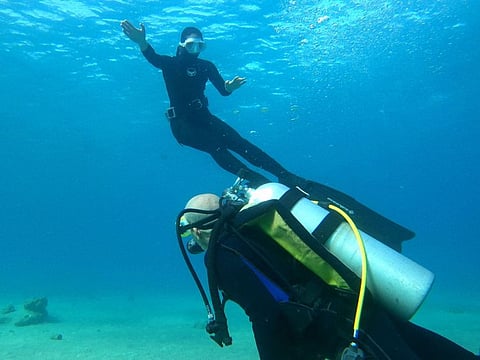'There’s a kind of tranquility to the sea': Israel’s October 7 Hamas attack survivors find solace underwater
‘It’s like you don’t hear anything, you only hear the music of the sea’

EILAT, Israel: Deep under the Red Sea, a passing Israeli warship could barely be heard as Yamit Avital held her breath and dived, her mind briefly cleared of the trauma of the October 7 Hamas attacks.
“There’s a kind of tranquility to the sea, in the deep,” Avital said after she emerged from 20 metres (66 feet) under the aquamarine waters of the Gulf of Aqaba, also known in Israel as the Gulf of Eilat.
“It’s like you don’t hear anything, you only hear the music of the sea.”
She and her husband Benny are among the survivors from Nir Oz, one of the hardest hit kibbutzim in Hamas’s devastating attacks that left at least 1,140 people dead in southern Israel, according to an AFP tally based on the latest Israeli figures.
Israel has vowed to destroy Hamas and launched a punishing offensive that has reduced vast areas of Gaza to a ruined wasteland and killed at least 21,978 people, mostly women and children, according to the Hamas-run territory’s health ministry.
In the aftermath of the October 7 attacks, the Avitals and their three children were evacuated to Eilat, where they found themselves across the street from the coastal resort’s Coral Beach Nature Reserve and its dive clubs.
Israel’s diving federation, diving clubs in Eilat and dozens of volunteers have mobilised to offer evacuated Israelis courses in scuba diving and free diving - where divers plunge deep underwater on a single breath.
Yuval Goren, manager of the Aquasport dive club, said they were “desperate to give whatever we can” to help the evacuees.
Many participants said they found it a meditative exercise that assuaged their trauma.
‘You gave back my smile’
Studies have suggested that therapy through scuba and other diving methods can be beneficial for treating trauma.
The novel underwater setting, physical activity, breathing exercises and body control, and exposure to and overcoming fear, can all serve to mitigate emotional pain, experts say.
“We have learned that being in the water and underwater has huge beneficial emotional effects,” said Yotam Dagan, a psychologist who helped mobilise the diving federation’s training efforts.
The sense of weightlessness, the slowed breathing and heart rate “lowers stress in a very meaningful way, not only during the diving session itself, but also beyond that, into the next minutes, hours, sometimes more than that”, he said.
Instructor Ofer Mor has been running a project for children and adults from Nir Oz and other evacuees at the Snuba Dive Centre in Eilat.
She said the course was “very calm, very slow” and focused on the individual needs of the participants.
“One of the feedbacks at the beginning was ‘you gave me back my smile,’” she said.
For the past two months, Shai Wolf, a volunteer free diving instructor for Aquasport, has shown evacuees proper breathing and diving techniques and “to know peace and quiet under water”.
“It was simply moving to see them always improving, feeling much better, and ready to go out to a new reality,” said Wolf.
‘That feeling at 23 metres’
Around a quarter of Nir Oz’s 400 residents were killed or taken hostage on October 7.
Some captives from Nir Oz were released in November in a deal with Hamas, but 129 people are still held captive.
Benny Avital’s brother was killed defending a nearby village, while he and his three children narrowly escaped death barricaded in their safe room. Both he and his wife Yamit lost friends and neighbours who were killed or taken hostage.
“Something in that feeling at 23 metres deep, when the lungs are collapsing and the diaphragm hurts and the throat is totally choked, and the toes clench - that’s the feeling that accompanied me throughout... October 7 and 8,” Yamit said.
“At the end of the day to feel it, and know what it is, and return to the surface and take a fresh breath of air - that’s something very therapeutic, very healing.”
However the Avitals will soon be unable to continue diving daily as their kibbutz is leaving Eilat for longer term accommodation in landlocked Kiryat Gat.
“There’s a long way to go, we know this,” Benny said, but it was “really our good fortune we got this hotel by the sea”.
Sign up for the Daily Briefing
Get the latest news and updates straight to your inbox



